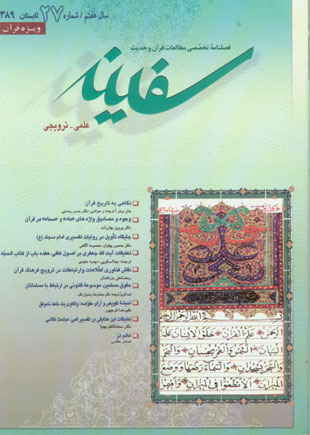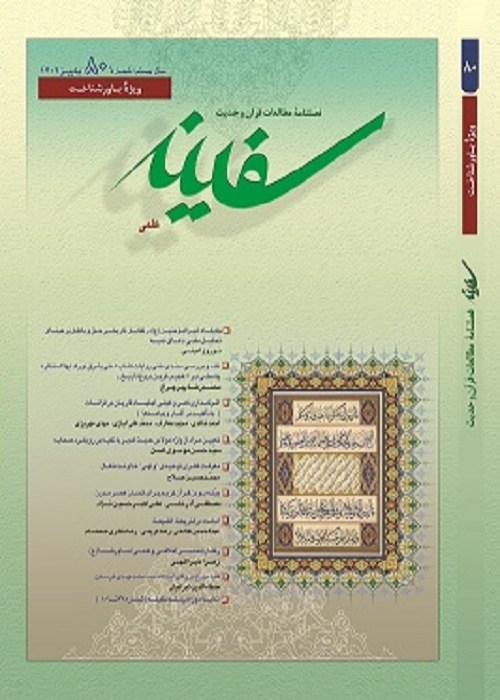فهرست مطالب

نشریه سفینه
پیاپی 27 (تابستان 1389)
- ویژه قرآن
- 196 صفحه،
- تاریخ انتشار: 1389/05/25
- تعداد عناوین: 14
-
-
صفحه 5
- مقالات
-
صفحه 12به عقیده نویسنده، انگیزه عثمان در جمع قرآن، هراس از گسترش اختلاف قرائت ها در میان مسلمانان بود که مبادا آن اختلاف، مسلمانان را چون یهودیان و مسیحیان بر سر کتابشان به اختلاف دچار سازد. پیش از او، ابوبکر آیات قرآنرا گرد آورد، ولی آن مجموعه را منتشر نکرد، عثمان که از فقدان مصحف واحد در میان مسلمانان احساس خطر می کرد، قرآن گردآوری شده ابوبکر را انتشار داد.
مترجم در چند مورد، نقدهایی بر کلام جان برتن بیان کرده است، ازجمله: روایت زهری در کتاب المصاحف، نظر شیعیان در مورد قرآن، روایات نزول قرآن به هفت حرف، نزول قرآن به لهجه قریش، تبدیل کلمات قرآن به مترادف آنها.
کلیدواژگان: برتن، جان، جمع قرآن، عثمان، اختلاف قرائت ها، حدیث سبعه احرف، دیدگاه شیعه در باب قرآن -
صفحه 55معانی واژه های «ماء» و «سماء»، در این مقاله مورد بررسی است. «ماء» در قرآن، در دو بعد مادی و معنوی مطرح شده است. در بعد مادی، مصادیقی مثل آب نوشیدنی، باران و نطقه؛ و در بعد معنوی، مصادیقی مثل: حامل عرش الهی، پاداش استقامت در راه حق و مایه تالیف قلوب دارد.
کلمه «سماء» نیز در اصل به معنای رفعت و بلندی است. در قرآن، این کلمه نیز دو بعد مادی و معنوی دارد: مادی یعنی آسمان که همگان می بینند. معنوی، مانند غیب و ملکوت.
کلیدواژگان: ماء، سماء، آب، آسمان، عرش، آگاهی، شعور، برکت، معنا و مصداق، مفردات قرآن -
صفحه 70بخش قابل توجهی از روایات تفسیری را که از امام سجاد 7 برجای مانده، تاویل آیات و ارائه مصادیق آنها تشکیل می دهد. این روایات نقش تعیین کننده ای در بازسازی عقاید جامعه پس از شهادت سید الشهداء 7 دارد، در این گفتار، فزونی روایات تاویلی و تعیین مصادیق آیات، بر پایه مخاطب و فضای صدور روایات تحلیل شده است.
نگارنده، نمونه هایی از موضوع های این روایات را بدین سان برمی شمارد: بازسازی بنیان تفکر ولایت مدار، ترسیم محورهای تفکر مهدوی، تعیین مصادیق آیات.
کلیدواژگان: امام سجاد 7، تفسیر ماثور، تاویل، مصداق، مهدویت در قرآن، امامت در قرآن -
صفحه 85آیت الله شیخ محمدرضا جعفری ضمن ترجمه انگلیسی کتاب اصول کافی، تعلیقات ارزشمندی بر آن افزوده است. در این گفتار، تعلیقات نگارنده بر هفده باب کافی آمده است. نگارنده در این تعلیقات، درباره سلیمان و ابوذر، حکومت عباسیان، نام بعضی از راویان احادیث، و درون مایه احادیث، نکات مهمی بیان کرده است.
کلیدواژگان: کافی، کتاب الحجه، تاریخ شیعه، قرن دوم هجری (هشتم میلادی)، واقفه، سلمان، ابوذر -
صفحه 99نگارنده این گفتار را با بررسی تاثیر فناوری اطلاعات و ارتباطات در فهم قرآن آغاز می کند، ازجمله: ذخیره و بازیابی آسان اطلاعات، ایجاد ارتباط در فضای مجازی و حفاظت نسخه های خطی قدیمی. پس از آن به راهکارهای استفاده بهینه از اینترنت در ترویج فرهنگ قرآنی اشاره می کند به دو روش. یکی: مراجعه به موتورهای جستجو. دوم: مراجعه به فضاهای طبقه بندی موضوعی در اینترنت. آنگاه تحت عنوان راهکارهای بهینه سازی شناخت و دسترسی اطلاعات قرآنی، چهار مورد از این راهکارها را بیان می دارد. آسیب شناسی سایت ها و وبلاگ های قرآنی (ازجمله روزآمد نشدن و ارتباط یک سویه)، و پس از آن راهکارهای بهینه سازی این سایت ها و وبلاگ ها و مانند: مخاطب محوری، پاسخ به پرسش ها، توجه به ابعاد جهانی قرآن، توسعه وبلاگ های تخصصی و موضوعی (گروهی) عنوان دیگر است. و سرانجام، پیشنهادهای خاص نویسنده پایان بخش گفتار است.
کلیدواژگان: قرآن در جهان معاصر، فناوری اطلاعات و ارتباطات، اینترنت، آسیب شناسی، اینترنت، راهکارها - معرفی کتاب
-
صفحه 115نگارنده در این گفتار، تفسیر مصباح الهدی نوشته میرزا جواد تهرانی را شناسانده، شیوه تفسیری و درونمایه آن را مرور می کند. شرح حال مختصر میرزا جواد تهرانی نیز در این گفتار آمده است.
کلیدواژگان: مصباح الهدی (کتاب)، تهرانی، جواد، علمای خراسان، تفسیر قرآن، تفاسیر شیعه -
صفحه 126
- نکته پژوهشی
-
صفحه 131این گفتار، ترجمه مقدمه امده کری بر ترجمه فرانسوی کتاب شرایع الاسلام محقق حلی است. کری که در اواخر قرن 19 میلادی، این ترجمه را به سامان رسانده در مقدمه خود، به تاریخ فقه و حقوق اسلامی اشاره می کند، ازجمله: شیخ مفید، شیخ طوسی، سید مرتضی. سپس به تفصیل در مورد شرح حال محقق حلی و شناسایی کتاب شرایع الاسلام می پردازد. نگاه خاص برون دینی به فقه شیعی را در این گفتار می توان یافت.
کلیدواژگان: شرایع الاسلام (کتاب)، محقق حلی، ترجمه متون دینی -
صفحه 137صحت نقد و بررسی تاریخ تفکر هر مذهبی بیش از هر چیز نیازمند دسترسی به منابع متقن و موثق است. پس از آن، ایده پردازی صحیح در ارائه طرحی جامع در این زمینه نیازمند تحلیل های سالمی است که توانایی جمع اطلاعات پراکنده را به همراه داشته و از هجوم نقض های پی در پی در امان باشد. در طراحی تاریخ تفکر شیعه، برخی مبتلا به افراط و تفریط هایی شده اند که نتیجه ای جز ارائه طرحی ناقص و ناکارآمد نداشته است.
- اسناد و متون
-
صفحه 157ابن عتایقی حلی (متوفی 786 هجری)، از دانشمندان قرن هشتم حله و صاحب آثار فراوانی است که بیشتر آنها تاکنون چاپ نشده است. یکی از آثار چاپ نشده او، خلاصه ای است که از تفسیر علیبن ابراهیم قمی (دانشمند شیعی قرن چهارم هجری) فراهم آورده و نزدیک به یکصد و پنجاه مورد تعلیقه بر آن افزوده است. در این گفتار، 24 تعلیقه ابن عتایقی در مباحث کلامی براساس دو نسخه خطی از تفسیر مزبور آمده است.
کلیدواژگان: تفسیر علی بن ابراهیم قمی (کتاب)، قمی، علی بن ابراهیم (قرن چهارم)، شیعه، تفسیر ماثور، ابن عتایقی حلی، عبدالرحمان (قرن هشتم)، تفسیر قمی، مباحث تفسیری، تفسیر قمی، مباحث کلامی، کلام امامیه - واژه نامه عقاید
-
صفحه 169
-
صفحه 182
-
صفحه 184
-
Page 12According to Berton, the intention of Ottoman in collecting and compilation of the Holy verses of Quran was his consideration to prevent any disagreement about the words and recitation of Quran among the muslim people. He was worried about any argument in the muslim community, just as it happened in the earlier Jewish and Christian communities about their Books.Before Ottoman, Abu Bakr had collected the Quranic verses, but did not publish it. Ottoman who was thoughtful about the lack of a "uniform" copy of the Divine Book in the muslim community, decided to publish the...The translator, Mr. Rezaei, has included a few comments to the views of Berton, such as: The word of Zohari in his book, "Al-Masahaf", the view of the Shia Imams about the holy Quran, those tradition which express that the holy Quran has been relavated in 7 dialects, the relevation of the holy verses of Quran in the Quraish dialect, the possibility of substitution of the Quranic words with their synonyms.
-
Page 55This article is a study of the meaning of the words, "Ma" and "Sama". These words have been used in the holy Quran in both material and spiritual aspects. "Ma" in the material aspect has the meanings of "drinking water", "raining water", "the male seed" or "progeny". But in its spiritual aspect it means "the carrier of the Divine Throne", "The Rewards for Resistance in the Right path", "the cause to Attract the hearts",...The word "Sama" which originally means "highness", has been used in both aspects in the holy Quran. In the material aspect it means "the sky" that is visible to all. But in the spiritual context it means "the invisible spiritual world", "the celestial world", etc.
-
Page 70A remarkable part of the explanatory traditions quoted from Imam Sajjad (p.b.u.h.) includes the interpretation (Tavil) of the holy verses of Quran, and providing exact evidences and meaning for the described events in the Quran. Those traditions have had an essential role in reshaping the faith and belief of people after the martyrdom of Imam Hossein - Sayyid Al-Shohada (p.b.u.h.).In this essay, those traditions, and some probable differences in them have been analyzed according to the time and addressee of those traditions. Some of the main subjects of those traditions are as below: - Reshaping the school of the Shia Imams in the explanation of the holy verses of Quran;- Discussing the axes of thoughts and verses about Imam Mahdi and the final prosperity of mankind;- Providing exact evidence(s) about the Quranic verses.
-
Page 85At the time of translating the book "Kafi", the late Ayattolah Mohammad Reza Jafari made valuable additions to it. In this essay the additions to 17 chapters of Kafi are collected that provide important information about Salman and AbuZar (the respected companions of the holy Prophet (p.b.u.h.); the Abbasid state: Some of the narrators of the traditions: and the contents of some of those traditions.
-
Page 99The writer has begun his article by a study of the influence of IT & ITC in the field of Quran and its understanding; easy access and download of information, possibility of communication in the virtual world; preserving the old valuable manuscript of Quran, etc.Then he attends the suitable approaches in Internet, to promote the Quranic culture by usage of search engines or searching the Quranic information & proposals are given:1. Defects of the Quranic sites & blogs (late updating of information, and one - way communication)2. Respect the readers of the sites, answering their questions, considering the worldwide aspects of the Quranic teachings and culture establishment of specialized sites, blogs, and groups in the Quranic fields.
-
Page 115In this article, the respected writer has introduced the commentary book of the holy Quran. "Misbah Al-Hoda", the remarkeable work of Mirza javad Tehrani, along with a biography of Mirza Tehrani, and a review of his method of comment and its contents.
-
Page 131This is a Persian translation of the introduction written by Emede Kree to the French translation of "Sharaye Al-Islam" - the great work of the late Shia grand scholar, Al-Helli - which was performed in the 19th century.In this introduction the history of the Islamic law and jurisprudence, and the influences and works of the great Shia scholars, such as Shaikh Mofid, Shaikh Toosi, Seyed Murteza, and, in more detail, the biography of Mohaqqeq Helli have been reviewed.One may clearly observe a non-Shia or non-religious viewpoint to the Shia jurisprudence in this essay.
-
Page 157Ibne Atayeqi Helli (died in 786 A.H.), was from the scholars of the 8th Islamic century of Hella city (Iraq), who had a lot of works, while most of them are not published. One of his unpublished works is an abstract of the Quranic commentary of Ali Ibne Ibrahim Qummi (the Shia scholar of the 4th century A.H.)In this essay 24 cases of the above mentioned points, which are related to theological affairs, have been discussed.Keywords: The commentary of Ali Ibne Ibrahim Qummi (book) / Ali Ibne Ibrahim (the 4th century A.H.) / Shia / the Quranic commentary quoted from the Holy Imams / Ibne Atayeqi Helli, Abdul-Rahman (the 8th century A.H.) / The Qummi commentary / Commentary affairs / The Qummi Commentary / Theological affairs / The Shia Immamiyya Theology.


